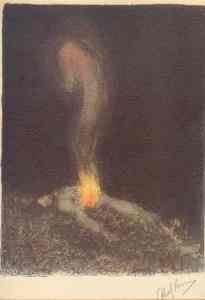
Given that part of Converge’s DNA is punk and most likely ever will be, and that their last album, All We Love We Leave Behind, came out in 2012, I wondered whether The Dusk In Us would draw directly from changes in their home nation of the U.S. They’ve never been a political band (at least, not ostensibly; can you think of a facet of Converge that proves otherwise?), but, as little Bobbie Z once said, the times they are a changin’.
So have Converge gone political? Across its 13 tracks and 44 minutes, on a cursory listen, the answer is no. Converge’s go–to subject area for lyrics continues to be human connections; vocalist Jacob Bannon is still screaming about having heart, and there a lot of lyrics like
the little lies, the distorted truths
smeared the perspective and made me love you
queen of the garbage, prince of the weeds (Under Duress)
However, a couple of listens in, the abstract nature of this language makes The Dusk In Us is a lot more ambiguous than the first listen suggests; Year of The Quarrel contains the lines ‘the little lies, distorted truths/smeared the perspective and made me love you’, Under Duress states ‘compassion bends under duress/wouldn’t need a gun if you didn’t have one/don’t need you to serve or protect’, and closing track Reptilian starts with ‘futile wars for fruitless words/written by shadow kings’. This could all mean something, but just as equally could be but what my ears behold. The advantage of this lyrical style, common in hardcore and its derivatives, is that it lends itself to a very precise definition and feeling for its adherents (it’s about me; I can relate to this) whilst being abstract enough to be open to interpretation (be strong; be united; it’s us against them).
Something less open to interpretation is TDIU’s continuation of the more melodic nature of All We Leave Behind. A Single Tear opens with a squiggly guitar line and big band–style drumming (I wonder if drummer Ben Koller likes jazz) and the gang shout in chorus is absolutely propulsive. Under Duress has a shovelling bass intro and a verse riff that sways around, and eponymous sixth track The Dusk In Us is a mellow, midpoint break. Even the feral Wildlife is approachable in that it serves as a kind of an entry point into Converge; the imperative tone, the busy drumming, the tremolo picking, the structure – this is the verse, this is the chorus, this is the interlude. Bannon’s vocals are still quite squawky, but I can tell which songs are which. That said, fans of skronk don’t freak out; there are still numbers that sound like Taz just spun into a guitar and a mic; Year of The Quarrel is relentless, Broken By Light absolutely flies through riffs in its one minute and 45 seconds, and after the queasy hammer–on–pull–off bass intro of Trigger, it turns out guitarist Kurt Ballou is still finding those left–over Slayer riffs. There are also the curve balls; the fast, snappy breaks of Arkhibov Calm (reminiscent of AWLWLB’s Sadness Comes Home), the weirdness of Murk & Marrow (strange structure, strange noises, strangely compelling), and I Can Tell You About Pain, AKA I can tell you about weird time signatures.
The Dusk In Us can be about politics if you want it to be. What is more definitive is that this album supports the premise that it’s best to work backwards with Converge, and that the gradual shift to a more melodic approach has led to increasingly rewarding listens.
Advertisements Share this:




